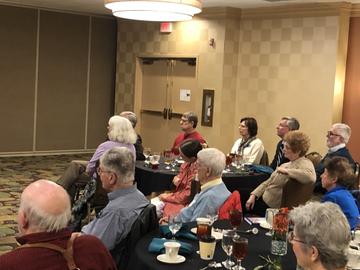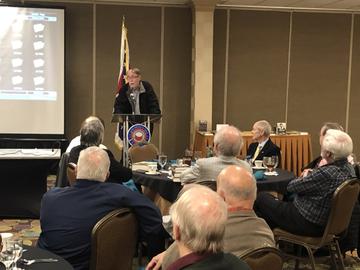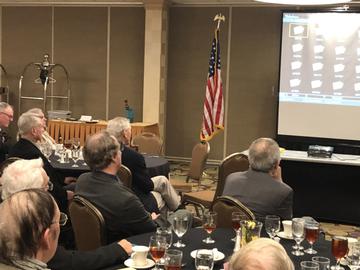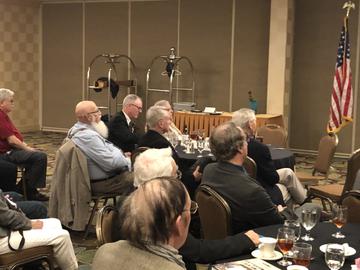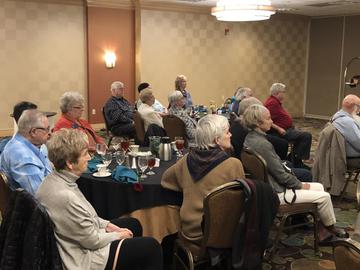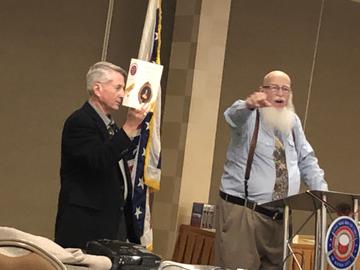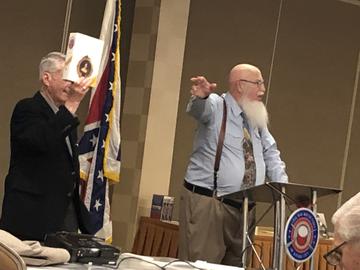March 2019

At the dinner meeting on March 26, Mr. Larry Wood front Joplin MO gave an interesting presentation about his book titled: Bush-whacker Belles: The Sisters, Wives, and Girlfriends of the Missouri Guerillas. Sometimes connected by blood but always united in purpose, these wives, sisters, daughters, lovers, friends, and mothers risked their lives and their freedom to give aid and comfort to their menfolk. A number of the women were arrested and sent to jail or prison.
The term "Bushwhacker Belles" was first used in 1891 in the St. Louis Globe Democrat newspaper. Most of Mr. Wood's research came from Union Provost Marshal Records. Some of the key questions that Mr. Wood addressed during his presentation are as follows:
What was the political climate in Missouri, which gave rise to guerilla warfare?
- The average Missourian needed a reason besides slavery to support the Southern cause.
- Because Missouri was a slave state and a border state, the pro-southern men must protect the State against a Federal invasion. Sexual imagery was used to promote this narrative.
- The State was seen as female, but individual citizens were male. The guerillas must protect women symbolically as well as literally. There was as an unwritten guerilla code.
- The creation and disintegration of the Missouri State Guard.
- The myth of a noble warrior protecting hearth and home had a powerful allure, but the myth was challenged by the realities of war. Women were left alone, were no longer dependent, and were forced to deal with the Federals on their own, which put them in danger, but also empowered them. The Union treated the women as outside of the war at first, but this gradually changed, especially by 1864.
- The counties along the Missouri River were known as the "Little Dixie" area. That was the predominant clash area and included Boone, Howard, Saline, Lafayette, and Jackson counties. Until 1863-1864, the women were not taken seriously. The Union Army was slow to realize that guerilla warfare was a real threat.
Who were the women that were arrested for aiding the Missouri Guerillas?
- Almost all had southern roots.
- Most were young (in their late teens, early 20's). Most came from the "Little Dixie" counties.
- Most were arrested in 1864, which was the peak tune for guerilla warfare.
- Tended to come from well-established families.
- hey were fairly well educated.
- They considered themselves ladies.
- Most came from households headed by a woman. Most women were arrested for aiding the guerillas, because the men were not there to protect the women.
- Not all were equally guilty, ranging from those convicted of serious crimes to those who should never have been arrested to begin with. Most were arrested for feeding and harboring guerillas.
- Then punishment varied arrd then fates often hinged on factors beyond guilt or innocence, such as: who their family was and how pretty and charming they were.
How did the women behave when arrested?
- They were defiant at first.
- They adopted survival lies.
If not coerced, why did the women help the guerillas?
- Helping the guerillas was usually an act of love, not an act of war.
- The Civil War empowered the women who helped the Missouri guerillas. It forced the Federals to take them seriously. But it was an empowerment that most did not even want.
Mr. Wood told us stories about several Bushwhacker Belles, including: Eliza Gabbert, Ella Mayfield, Sarah Waitman, Fannie Houx, Annie Fickle, Nannie Harris, Charity Kerr, and Sarah Jane Smith.

